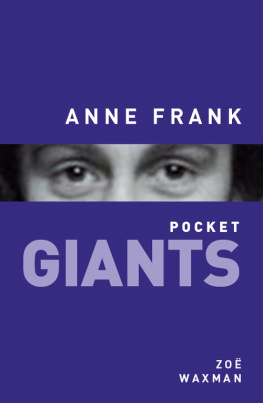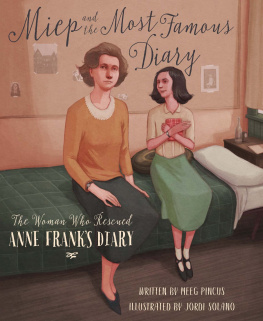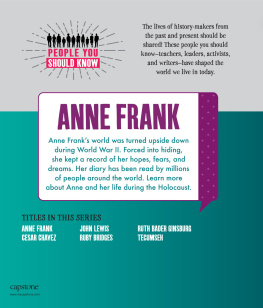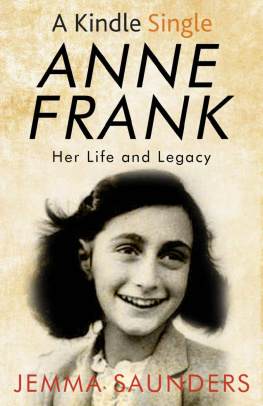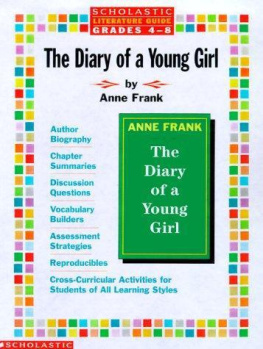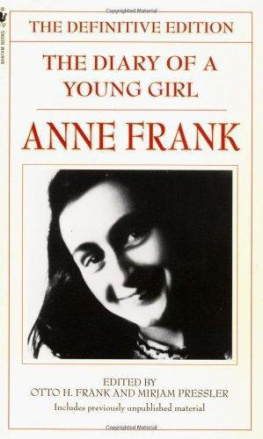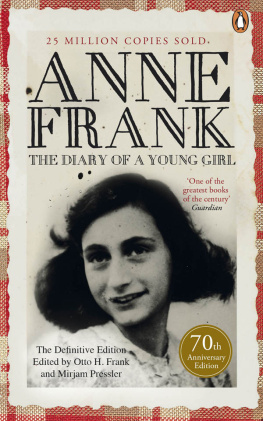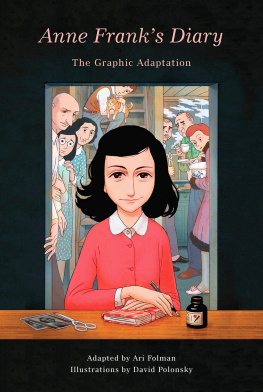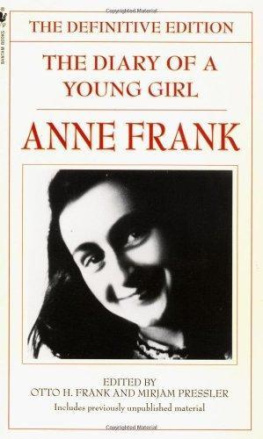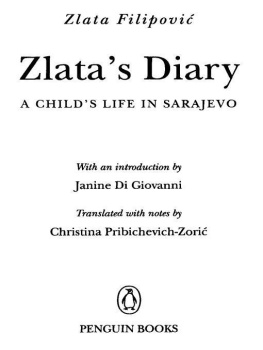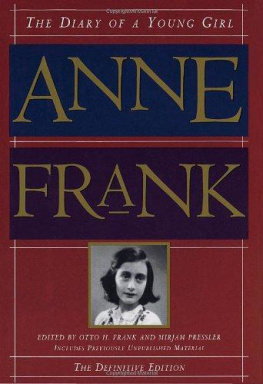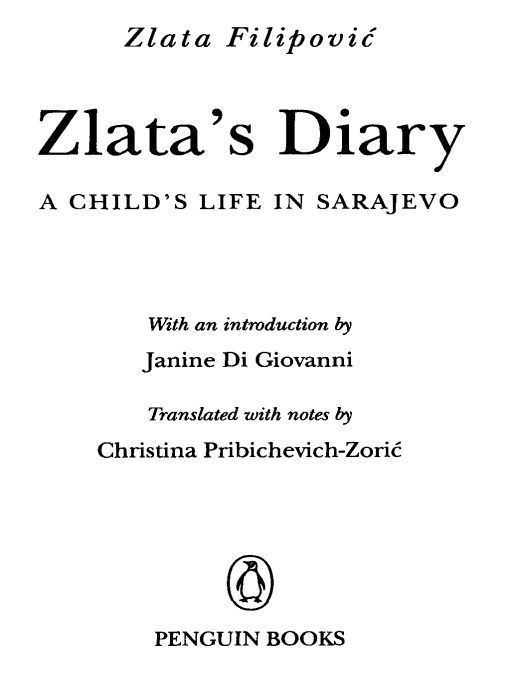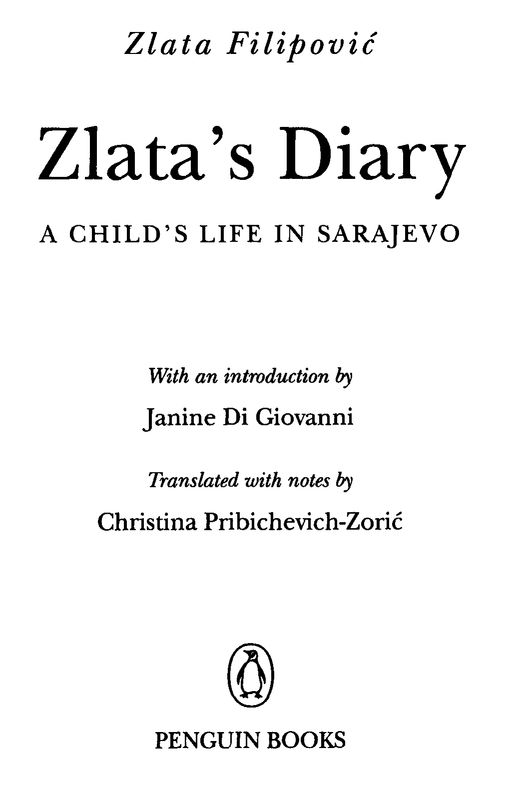Table of Contents
Praise for Zlatas Diary
Heartrending
The San Diego Union-Tribune
[This book is] written in pure innocence and desperation, and one longs to protect it, much as one would a child.... Touching.
The New York Times Book Review
Ebullient and accomplished.... With a precision and vision beyond her years ... Zlata brings Sarajevo home as no news report can.
Booklist
The harsh realities of the Bosnian conflict are brought to life in this chronicle.... Recommended.
Library Journal
Moving
The Washington Post
[Filipovics] story is a jarring one of hunger, fear, and cold.... Striking.
The Christian Science Monitor
[Zlata is] a gifted young writer.
The Philadelphia Inquirer
[Zlatas Diary] is a warm-hearted and wide-eyed view of gathering horror written by a precociously mature teenager.
The New York Review of Books
PENGUIN BOOKS
ZLATAS DIARY
Zlata Filipovic wrote her diary over a two-year period, from September 1991 to October 1993. Originally published in Croat, Zlatas Diary has appeared throughout the world. She and her parents were allowed to leave Sarajevo just before Christmas, 1993. They are now living in Ireland.
Preface
Dublin, June 2005
First of all, let me thank you for picking up this book. In some ways it seems like a long time ago that it was written, being a record of a conflict that many people have forgotten about and that has been replaced in our collective memory by numerous other conflicts. I still find it baffling that this diarythese scribblings of mine that I originally started writing for myselfeven became a book, let alone that people are still reading it today.
I also want to thank all those who wrote to me, the large number of young people and adults who read my diary and were somehow touched by the story, who reacted to it and wrote me many e-mails and letters. I tried to answer as many as I could, but I did not manage to respond to all of them, and I dedicate this new preface to you all.
When the war began in my native Sarajevo, I always said that my life was cut into twothe period before the war and the period since the war began which I, like so many people from my country, still feel has not ended. The year 2005 marks the tenth anniversary since the war ended in Bosnia, and somehow we all still commemorate these anniversaries , remember these datesthe day the war began, the day we had our first real day of shooting, the day my mom barely escaped death, the day various friends and family members were killed, the day we got our first aid package, the day my parents and I left Bosnia, the day the peace treaty was signed. All these dates are so ingrained in me that each time such a day comes in the year, the first thought of that day is dedicated to the significance of it. Maybe that is just the destiny of a diary writer, someone obsessed by dates, but maybe it is also because the war and everything surrounding it is the biggest thing I have ever experienced, and will always remain one of the most important experiences of my life.
It is strange looking back it on it all now, with the perspective of time, with me that much older. I have not changed much. I feel happy that I am no longer sporting the haircut that still graces the cover of this book (lets face it, no one likes seeing a picture of themselves when they were twelve or thirteenlet alone on the cover of a book!). The story continues after my departure from Sarajevo and includes several cities and many new experiences. I went to high school in Paris until my family and I moved to Dublin, Ireland, in October 1995 (this year is another anniversarymy ten-year anniversary of living in Dublin). I went to school there, picked up the pieces of my childhood which turned into quite fun teenage years, and ended up going to college in Oxford, England, when I was seventeen. Getting back to school and being a schoolgirl again, something I wanted so badly in the middle of the war, happened without much difficultyin fact, most young people who left the war and had had their educations interrupted ended up compensating really quickly and wellmaybe we were all very hungry for learning. Three glorious years went by in Oxford, whereupon I came back to Dublin, earned a postgraduate degree in International Peace Studies (unsurprisingly!) and I am slowly starting my grown-up career.
I often wonder why it was my diary that was published, when there must have been thousands of others written in Sarajevo, diaries that were probably more fluent and packed with events more grave and devastating than those that my family and I, in our luck, escaped. Somehow, it ended up being mine, so when I managed to leave Sarajevo after two years of war, I felt a responsibility to talk, to tell the story, the truth, to let the people know. Somewhat accidentally, at the age of thirteen, I became a spokesperson for what was going on in my country. I believed that those who would hear me would do something to stop it. So many children stayed behind, continued suffering, and they did not have a chance to escape and speak out. Cold and hungry, they were being killed every day and a great injustice was happeningthe total toll of dead in the Bosnian war is thought to be 250,000. My own friends and many members of my family stayed behind, and even though it was rather strange to be a spokesperson at the age of thirteen, I did it because I thought of them and all the people who were not lucky enough to have a chance to leave the war.
So I spoke. I spoke on radio and television. I spoke to newspapers. I spoke in schools, universities, at conferences and dinners, to politicians and ordinary people. I continued speaking even when my parents and I moved to Ireland, even when the war in Bosnia officially ended in 1995, because I felt it was important for people to hear about what it is like to be living in war, without freedom, without a normal life, with constant fear. People have often asked me whether I find it painful to recount my own experiences over and over againwouldnt I like to leave it all behind and make a life that did not include the war? For me, speaking about the war, raising awareness about conflict and in particular, children and ordinary people caught in the conflict, is almost a physical part of me, one I wear every day like my own brown hair.
At the start of this preface, I mentioned all the people who wrote to me, and who are still writing today, telling me their thoughts on my diary, on the war in Bosnia, on war in general. These moving missives came and still come from people ranging from the age of ten all the way up to grandmothers and grandfathers across the world. I have been so overwhelmed and so touched by all of them. Their writings have been filled with questions: Where am I now? What happened to my friends, neighbors, parents? Do I still keep a diary? Do I have a new pet? Do I have a boyfriend? Do I still like Madonna and Michael Jackson? Have I ever gone back to Bosnia?
Well, here are some answers. After we left, the war went on for two more years, which I did not record, but maybe another girl who stayed behind did. Everyone mentioned in the diary remained in Bosnia, although eventually my uncle Braco, my cousin Melika and my best friend Mirna managed to leave Bosnia and all three of them came to live with us in Paris. When the war finished, my parents, Mirna, and I went back to Sarajevo as soon as our school year was over, in the summer of 1996. That was when Mirna returned to live in Bosnia with her parents (and she has just graduated as an architect there), but my parents and I came back to Dublin. Since then, I have returned to Bosnia every year, every summer, like thousands of other people who left during the war and became citizens of new countries. I still keep a very close relationship with the city and this is something very important for me.


